【专项复习】小升初英语课件-核心考点 题型专项突破:专题 04 时态 第三讲 一般将来时 全国通用版(共41张PPT)
文档属性
| 名称 | 【专项复习】小升初英语课件-核心考点 题型专项突破:专题 04 时态 第三讲 一般将来时 全国通用版(共41张PPT) | 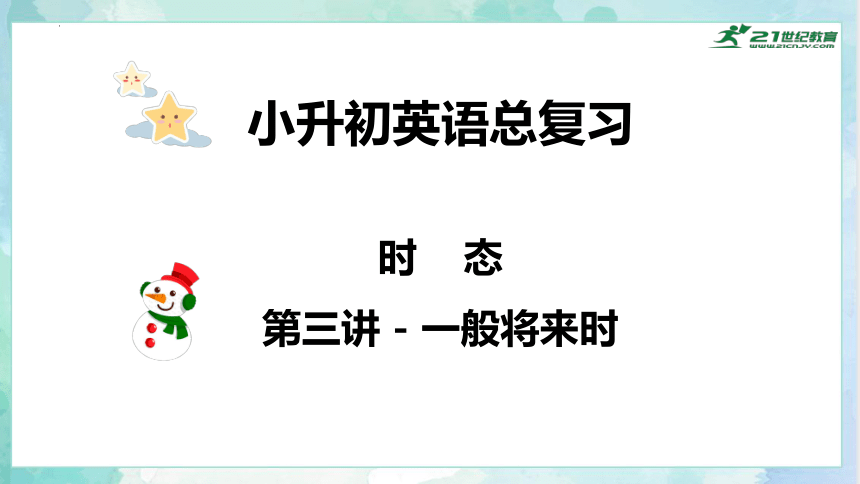 | |
| 格式 | pptx | ||
| 文件大小 | 5.0MB | ||
| 资源类型 | 试卷 | ||
| 版本资源 | 通用版 | ||
| 科目 | 英语 | ||
| 更新时间 | 2023-05-05 09:16:46 | ||
图片预览

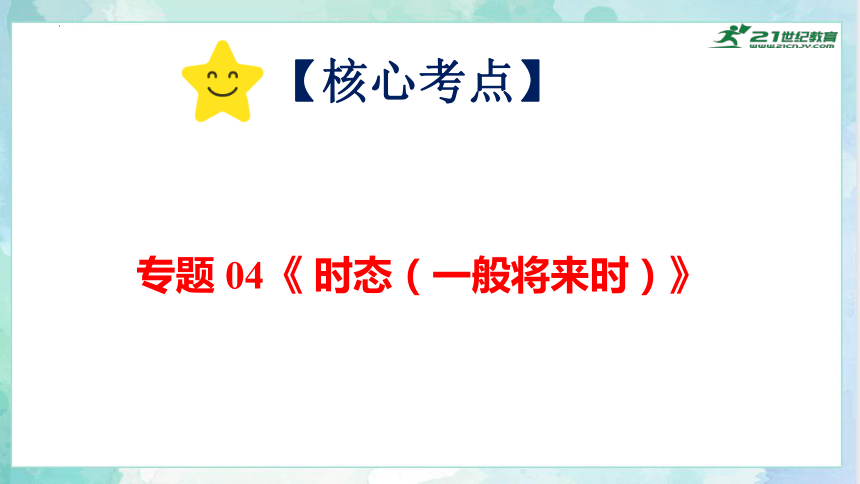
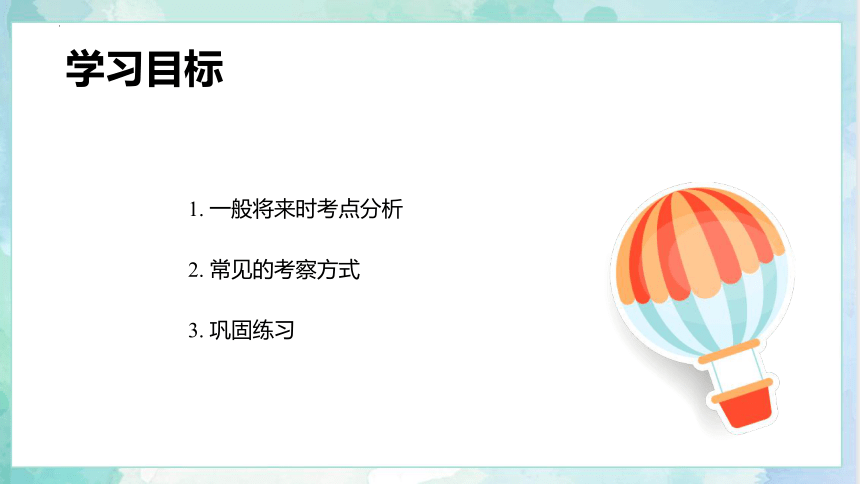
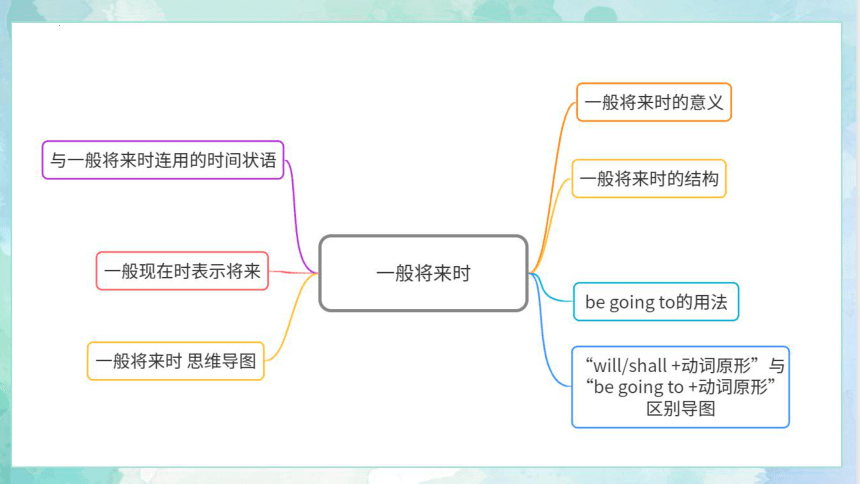
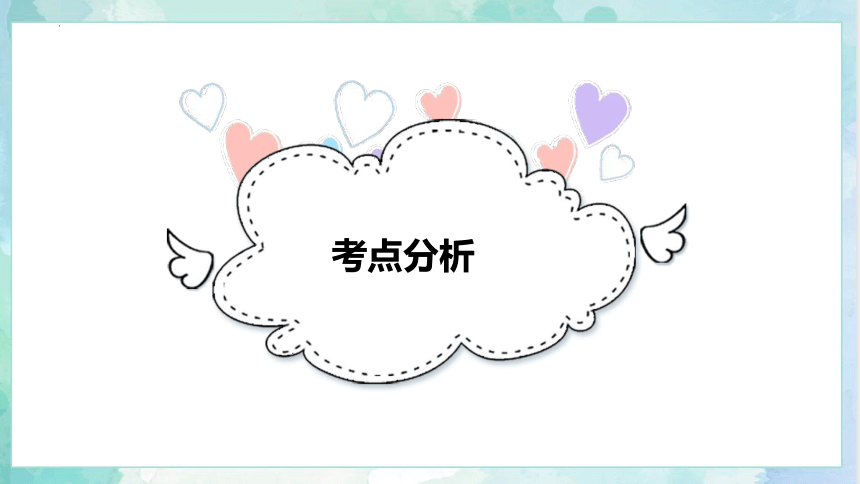
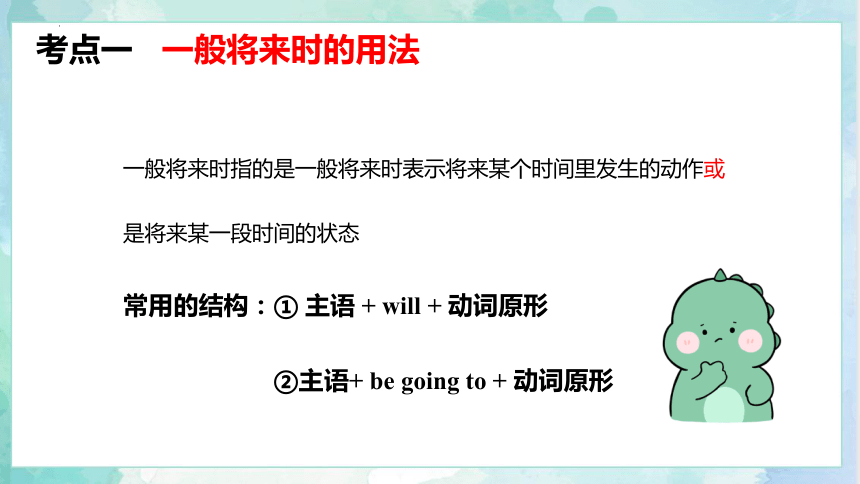
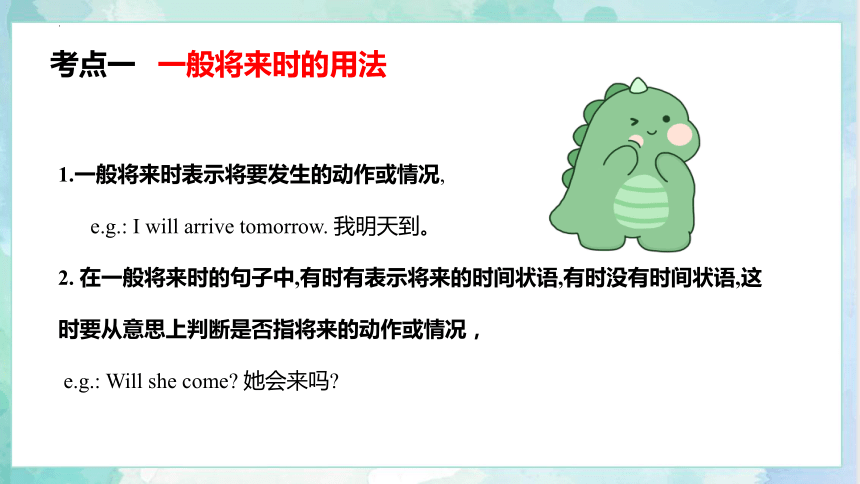
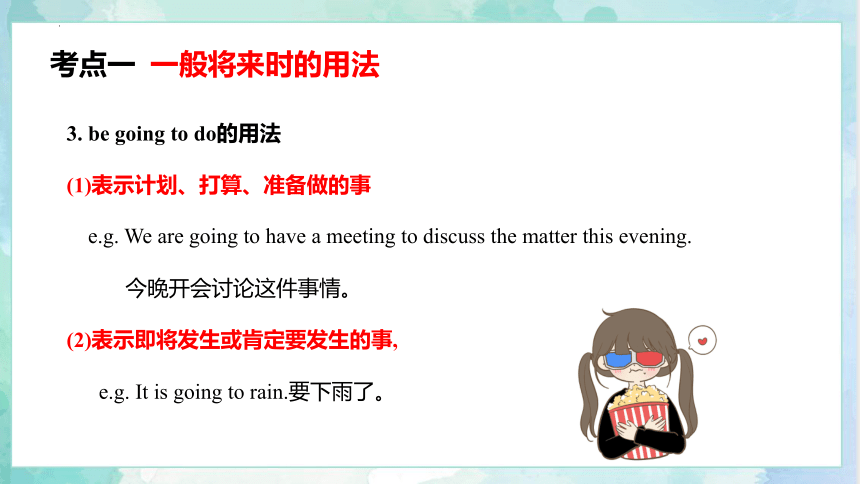
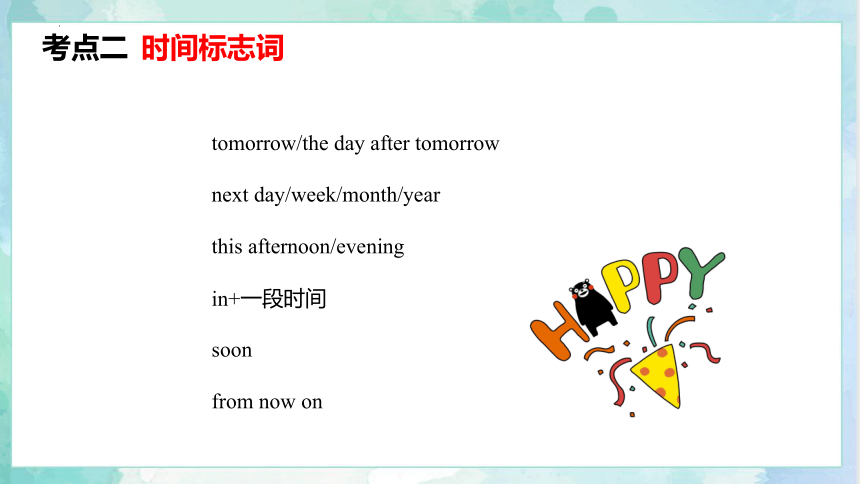
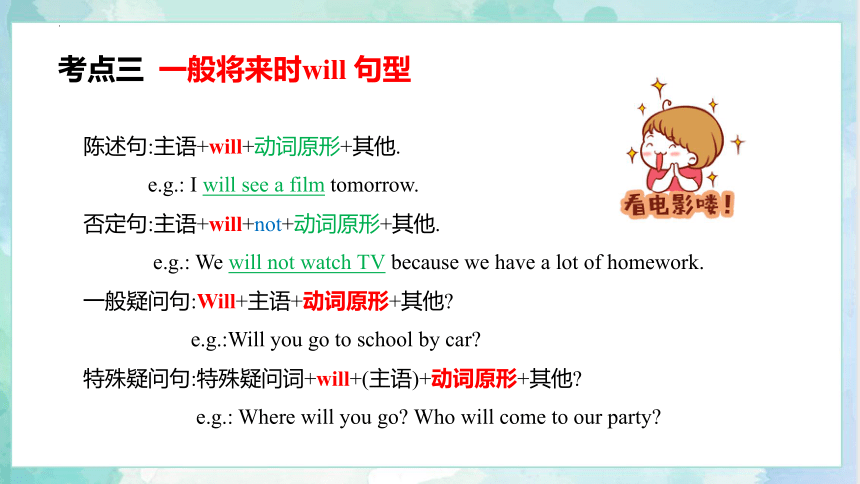
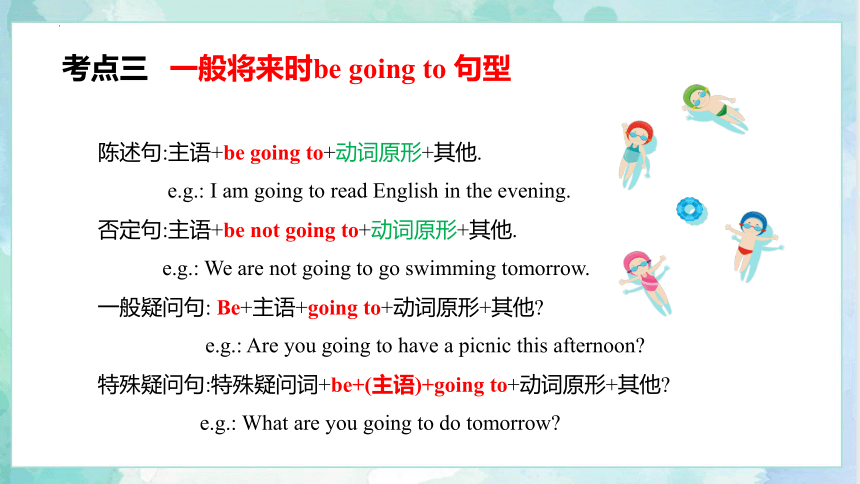
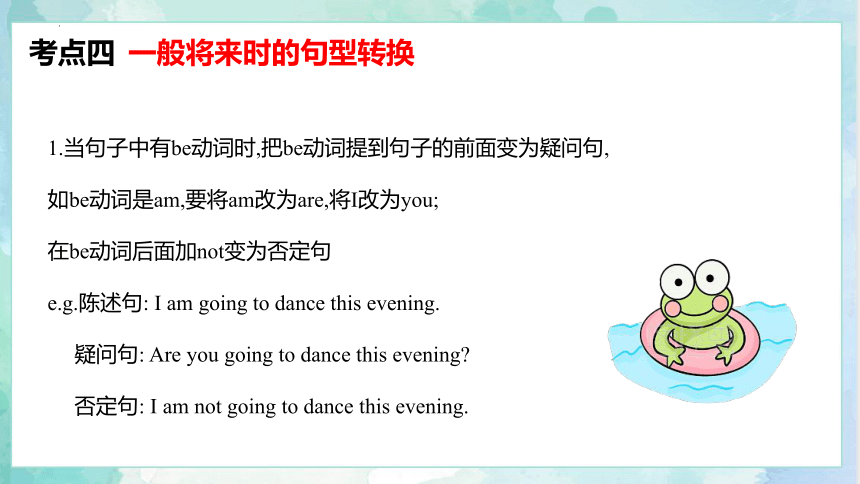
文档简介
(共41张PPT)
小升初英语总复习
时 态
第三讲 - 一般将来时
【核心考点】
专题 04《 时态(一般将来时)》
学习目标
1. 一般将来时考点分析
2. 常见的考察方式
3. 巩固练习
考点分析
考点一 一般将来时的用法
一般将来时指的是一般将来时表示将来某个时间里发生的动作或是将来某一段时间的状态
常用的结构:① 主语 + will + 动词原形
②主语+ be going to + 动词原形
考点一 一般将来时的用法
1.一般将来时表示将要发生的动作或情况,
e.g.: I will arrive tomorrow. 我明天到。
2. 在一般将来时的句子中,有时有表示将来的时间状语,有时没有时间状语,这时要从意思上判断是否指将来的动作或情况,
e.g.: Will she come 她会来吗
考点一 一般将来时的用法
3. be going to do的用法
(1)表示计划、打算、准备做的事
e.g. We are going to have a meeting to discuss the matter this evening.
今晚开会讨论这件事情。
(2)表示即将发生或肯定要发生的事,
e.g. It is going to rain.要下雨了。
考点二 时间标志词
tomorrow/the day after tomorrow
next day/week/month/year
this afternoon/evening
in+一段时间
soon
from now on
考点三 一般将来时will 句型
陈述句:主语+will+动词原形+其他.
e.g.: I will see a film tomorrow.
否定句:主语+will+not+动词原形+其他.
e.g.: We will not watch TV because we have a lot of homework.
一般疑问句:Will+主语+动词原形+其他
e.g.:Will you go to school by car
特殊疑问句:特殊疑问词+will+(主语)+动词原形+其他
e.g.: Where will you go Who will come to our party
考点三 一般将来时be going to 句型
陈述句:主语+be going to+动词原形+其他.
e.g.: I am going to read English in the evening.
否定句:主语+be not going to+动词原形+其他.
e.g.: We are not going to go swimming tomorrow.
一般疑问句: Be+主语+going to+动词原形+其他
e.g.: Are you going to have a picnic this afternoon
特殊疑问句:特殊疑问词+be+(主语)+going to+动词原形+其他
e.g.: What are you going to do tomorrow
考点四 一般将来时的句型转换
1.当句子中有be动词时,把be动词提到句子的前面变为疑问句,
如be动词是am,要将am改为are,将I改为you;
在be动词后面加not变为否定句
e.g.陈述句: I am going to dance this evening.
疑问句: Are you going to dance this evening
否定句: I am not going to dance this evening.
考点四 一般将来时的句型转换
2. 当句子中有will,将will提前到句首变为疑问句,句中第一人称(I/we)要变为第二人称(you);在will后加not变为否定句
e.g.:陈述句: We will go to Yunnan next week.
疑问句: Will you go to Yunnan next week
否定句: We will not go to Yunnan next week.
考点五 There be 句型一般将来时结构
一般形式:There be There is a meeting.
将来形式:There will be There will be a meeting.
There is/are going to be There is going to be a meeting.
考点五 There be 句型一般将来时结构
肯定句There will be +主语+其他
否定句There won't be+主语+其他
一般疑问句Will there be + 主语+其他
肯定答语 Yes, there will.
否定答语 No, there won't.
例 题 精 讲
【例1】We _________ a meeting next Monday.
A. are going to have B. is going to have C. will has
例题精讲
思路点拨:由“next Monday”可知题干是一般将来时,主语是we,be动词用are,且will后加动词原形,故选A。
【例2】I will ______ rice ______ my mother this evening.
A. cook; for B. cooks; to C. cooking; for
例题精讲
思路点拨:will后面接动词原形。
答案:A
【例3】 句型转换 we,have ,rain, will, a, heavy, wind, and, strong,tomorrow(连词成句)
_____________________________________________________________________
例题精讲
思路点拨: 明天我们将会有场大雨和强风.考查连词成句.句号表示陈述句,主谓宾结构."will"表示"将要",时态用一般将来时,后面跟动词原形have."aheavy rain"表示"大"; "and(和)"并列连词,"strong wind"表示"强风"; tomorrow时间状语,位于句末.故填:We will have a heavy rain and strong wind tomorrow.
【例4】 ---______ you ______ football tomorrow afternoon
--- Yes,we are.
A. Are, playing B. Do, play C. Are, going to play
思路点拨:考查一般将来时.play football 踢足球,tomorrow afternoon明天下午,根据问句中的tomorrow afternoon明天下午,可知应使用一般将来时态表未来,一般将来时的形式为be going to+动词原形.故答案:C.。
例题精讲
【例5】 My mother _______ me a computer as a birthday present next year.
A. gives B. will give C. gave D. give
例题精讲
思路点拨:句意:明年我的母亲要为我买一台电脑作为生日礼物。结合语境及时间状语可知本句描述的是将来的动作,故用一般将来时态。选答案B。
【例6】There ____ a basketball match between Grade 1 and Grade 2 on Friday afternoon.
A. have B. is going to be
C. has D.is going to have
例题精讲
思路点拨:句意:周五下午将会有一场一年级和二年级之同的篮球比赛。There is going to be将会举行。故选B。
【例7】 I ______ a foreign language next year.
A. will be learn B. am going to learn
C. learn D. learning
思路点拨 :句意:我明年打算学习一门外语。will be learn形式错误,应将be去掉; am going to learn将要学习,是一般将来时态; learn学习,动词原形; learning现在分词。根据句意next year可知,这里说的是将来的事情,故应用一般将来时态,故选B。
例题精讲
【例8】 The wind begins. It ______ a little cool.
A. will be B. can be C. should be D. would be
思路点拨:句意:起风了,会有点凉爽。will be将会是; can be可能是; should be应该是; would be过去将来时。根据句意可知,刮风会使天气变得凉爽,这里应用一般将来时态,故应选A。
例题精讲
【例9 】 ---I ______ take an English exam next Tuesday.
--- ______ you have taken everything you need.
A. am going, Make sure B. will, Make out
C. am going to, Make up D.will, Make sure
思路点拨:句意:-下周二我将进行一次英语测试。-确信你带上了你需要的一切。根据时间next Tuesday可知用将来时, be going to 或 will do; make sure,确信,弄清楚, make up 组成,构成。make out, 辨认。结合句意,故选D。
例题精讲
【例10】句型转换
They clean the classroom every day. ( tomorrow 代 every day)
They _____ ______ the classroom tomorrow.
思路点拨:句意:他们每天打扫教室。这是一般现在时的句子.用tomorrow代替every day后该用一般将来时态。
答案:will clean
例题精讲
【例11】句型转换
His father will be back next week. (对划线部分提问)
______ _______ his father be back
思路点拨:句意:他爸爸将在下周回来。该句是--般将来时,对时间提问要用特殊疑问词when,故正确答案为When will.
例题精讲
【例12】句型转换
He will leave Chongqing in two days. (对划线部分提问)
______ _______ will he leave Chongqing
思路点拨:两天后他要离开重庆。划线部分表示时间,两天后,对其提问可用how soon引起问句。所以可在改写后句子的空白处填写How soon。
例题精讲
【例13】 He' Il go to see the doctor tomorrow.(改为否定句)
He ____ ______ _____ _____ the doctor tomorrow.
思路点拨:明天他将去看医生。will+动词原形,否定形式是won'tdo,故填won' t go to see
例题精讲
【例14】They are going to have a sports meeting next week.(对画线部分提问)
____ ____ they going to have a sports meeting
思路点拨:句意:下周他们打算举行运动会。根据划线部分是时间状语,所以用when提问。be going to+动词原形构成的一般将来时态的句子变特殊疑问句时,用特殊疑问词+一般疑问句的形式,故填(1). When (2).are。
例题精讲
【例15】 -Will Bob study in the USA next year (补全定答语)
-Yes, _______ _______.
思路点拨:-一鲍勃明年将在美国学习吗 是的,他将要在美国学习。题干是一般将来时态,will是助动词,肯定回答中必须出现will, Bob在答语中要用he来替代,故答案为(1). he (2). will.
例题精讲
巩 固 练 习
单选题
1.We are going to _________ a picnic.
A. having B. has C. have
2.My mother will ___________ books with me.
A. read B. reads C. reading
3.My mother _________ some vegetables tomorrow morning.
A. is buying B. goes to buy C. is going to buy D. buys
C
A
C
单选题
4.Will Jill ___________ his grandparents
A. visited B. visit C. visits
5.—What are you going to do this weekend
—I'm going to ________ on Sunday.
A. swim B. swimming C. to swim
6.________ the future, I ________ a teacher.
A. In; am B. On; will C. In; will be
B
A
C
7.In the future, parks will _________ different.
A. is B. are C. be
8.The students _________ going to the zoo tomorrow.
A. is B. are C. was
9.My mum will ____zongzi in June.
A. do B. make C. does D. makes
C
B
B
1. We will meet at the bus stop at 10:30.(改一般疑问句)
_______ ________ meet at the bus stop at 10:30
2. She is going to listen to music after school.(对划线部分提问)
________ _______ she ________ ________ _________ after school
3. My father and mother are going to see a play the day after tomorrow.(同上)
_________ _________ going to see a play the day after tomorrow
Will you
What is going to do
Who is
用所给词的适当形式填空。
1. Today is a sunny day. We ___________________ (have) a picnic this afternoon.
2. My brother _______________ (go) to Shanghai next week.
3. Tom often ______________(go) to school on foot. But today is rain. He
______________ (go) to school by bike.
4. What do you usually do at weekends I usually __________ (watch) TV and
____________(catch) insects
5. It's Friday today. What _____she _________ (do) this weekend She
______________ (watch ) TV and _____________ (catch) insects.
will have
will go
goes
went
watch
catch
will do
wll watch
catch
用所给词的适当形式填空。
6. What ___________ (do) you do last Sunday I ____________ (pick) apples on a
farm. What ______________ (do) next Sunday I ______________ (milk) cows.
7. Mary ____________ (visit) her grandparents tomorrow.
8. Liu Tao ____________ (fly) kites in the playground yesterday.
9. David ______________ (give) a puppet show next Monday.
0. I ________________ (plan) for my study now.
did
picked
will you do
will milk
will visit
flew
will give
am planning
改错
1.My sister are going to play with her toy. ____改______
3.Tom and Ann will buying some clothes. _______改______
4.What do you do at home next Saturday ____改______
5.Is Lynn go fishing with you tomorrow ____改______
are is
buying buy
do will
Is Will
改错
6.Li Ming is going to singing a song tomorrow. ________改_________
7.My mother will makes a cake for my birthday. ______改_______
8. He will to write a letter to his mother. _______改________
9. You is going to fly a kite tomorrow _______改________
10.His sister will be five years old last year. ____改_____
singing sing
makes make
will to will
is are
will be was
小升初英语总复习
时 态
第三讲 - 一般将来时
【核心考点】
专题 04《 时态(一般将来时)》
学习目标
1. 一般将来时考点分析
2. 常见的考察方式
3. 巩固练习
考点分析
考点一 一般将来时的用法
一般将来时指的是一般将来时表示将来某个时间里发生的动作或是将来某一段时间的状态
常用的结构:① 主语 + will + 动词原形
②主语+ be going to + 动词原形
考点一 一般将来时的用法
1.一般将来时表示将要发生的动作或情况,
e.g.: I will arrive tomorrow. 我明天到。
2. 在一般将来时的句子中,有时有表示将来的时间状语,有时没有时间状语,这时要从意思上判断是否指将来的动作或情况,
e.g.: Will she come 她会来吗
考点一 一般将来时的用法
3. be going to do的用法
(1)表示计划、打算、准备做的事
e.g. We are going to have a meeting to discuss the matter this evening.
今晚开会讨论这件事情。
(2)表示即将发生或肯定要发生的事,
e.g. It is going to rain.要下雨了。
考点二 时间标志词
tomorrow/the day after tomorrow
next day/week/month/year
this afternoon/evening
in+一段时间
soon
from now on
考点三 一般将来时will 句型
陈述句:主语+will+动词原形+其他.
e.g.: I will see a film tomorrow.
否定句:主语+will+not+动词原形+其他.
e.g.: We will not watch TV because we have a lot of homework.
一般疑问句:Will+主语+动词原形+其他
e.g.:Will you go to school by car
特殊疑问句:特殊疑问词+will+(主语)+动词原形+其他
e.g.: Where will you go Who will come to our party
考点三 一般将来时be going to 句型
陈述句:主语+be going to+动词原形+其他.
e.g.: I am going to read English in the evening.
否定句:主语+be not going to+动词原形+其他.
e.g.: We are not going to go swimming tomorrow.
一般疑问句: Be+主语+going to+动词原形+其他
e.g.: Are you going to have a picnic this afternoon
特殊疑问句:特殊疑问词+be+(主语)+going to+动词原形+其他
e.g.: What are you going to do tomorrow
考点四 一般将来时的句型转换
1.当句子中有be动词时,把be动词提到句子的前面变为疑问句,
如be动词是am,要将am改为are,将I改为you;
在be动词后面加not变为否定句
e.g.陈述句: I am going to dance this evening.
疑问句: Are you going to dance this evening
否定句: I am not going to dance this evening.
考点四 一般将来时的句型转换
2. 当句子中有will,将will提前到句首变为疑问句,句中第一人称(I/we)要变为第二人称(you);在will后加not变为否定句
e.g.:陈述句: We will go to Yunnan next week.
疑问句: Will you go to Yunnan next week
否定句: We will not go to Yunnan next week.
考点五 There be 句型一般将来时结构
一般形式:There be There is a meeting.
将来形式:There will be There will be a meeting.
There is/are going to be There is going to be a meeting.
考点五 There be 句型一般将来时结构
肯定句There will be +主语+其他
否定句There won't be+主语+其他
一般疑问句Will there be + 主语+其他
肯定答语 Yes, there will.
否定答语 No, there won't.
例 题 精 讲
【例1】We _________ a meeting next Monday.
A. are going to have B. is going to have C. will has
例题精讲
思路点拨:由“next Monday”可知题干是一般将来时,主语是we,be动词用are,且will后加动词原形,故选A。
【例2】I will ______ rice ______ my mother this evening.
A. cook; for B. cooks; to C. cooking; for
例题精讲
思路点拨:will后面接动词原形。
答案:A
【例3】 句型转换 we,have ,rain, will, a, heavy, wind, and, strong,tomorrow(连词成句)
_____________________________________________________________________
例题精讲
思路点拨: 明天我们将会有场大雨和强风.考查连词成句.句号表示陈述句,主谓宾结构."will"表示"将要",时态用一般将来时,后面跟动词原形have."aheavy rain"表示"大"; "and(和)"并列连词,"strong wind"表示"强风"; tomorrow时间状语,位于句末.故填:We will have a heavy rain and strong wind tomorrow.
【例4】 ---______ you ______ football tomorrow afternoon
--- Yes,we are.
A. Are, playing B. Do, play C. Are, going to play
思路点拨:考查一般将来时.play football 踢足球,tomorrow afternoon明天下午,根据问句中的tomorrow afternoon明天下午,可知应使用一般将来时态表未来,一般将来时的形式为be going to+动词原形.故答案:C.。
例题精讲
【例5】 My mother _______ me a computer as a birthday present next year.
A. gives B. will give C. gave D. give
例题精讲
思路点拨:句意:明年我的母亲要为我买一台电脑作为生日礼物。结合语境及时间状语可知本句描述的是将来的动作,故用一般将来时态。选答案B。
【例6】There ____ a basketball match between Grade 1 and Grade 2 on Friday afternoon.
A. have B. is going to be
C. has D.is going to have
例题精讲
思路点拨:句意:周五下午将会有一场一年级和二年级之同的篮球比赛。There is going to be将会举行。故选B。
【例7】 I ______ a foreign language next year.
A. will be learn B. am going to learn
C. learn D. learning
思路点拨 :句意:我明年打算学习一门外语。will be learn形式错误,应将be去掉; am going to learn将要学习,是一般将来时态; learn学习,动词原形; learning现在分词。根据句意next year可知,这里说的是将来的事情,故应用一般将来时态,故选B。
例题精讲
【例8】 The wind begins. It ______ a little cool.
A. will be B. can be C. should be D. would be
思路点拨:句意:起风了,会有点凉爽。will be将会是; can be可能是; should be应该是; would be过去将来时。根据句意可知,刮风会使天气变得凉爽,这里应用一般将来时态,故应选A。
例题精讲
【例9 】 ---I ______ take an English exam next Tuesday.
--- ______ you have taken everything you need.
A. am going, Make sure B. will, Make out
C. am going to, Make up D.will, Make sure
思路点拨:句意:-下周二我将进行一次英语测试。-确信你带上了你需要的一切。根据时间next Tuesday可知用将来时, be going to 或 will do; make sure,确信,弄清楚, make up 组成,构成。make out, 辨认。结合句意,故选D。
例题精讲
【例10】句型转换
They clean the classroom every day. ( tomorrow 代 every day)
They _____ ______ the classroom tomorrow.
思路点拨:句意:他们每天打扫教室。这是一般现在时的句子.用tomorrow代替every day后该用一般将来时态。
答案:will clean
例题精讲
【例11】句型转换
His father will be back next week. (对划线部分提问)
______ _______ his father be back
思路点拨:句意:他爸爸将在下周回来。该句是--般将来时,对时间提问要用特殊疑问词when,故正确答案为When will.
例题精讲
【例12】句型转换
He will leave Chongqing in two days. (对划线部分提问)
______ _______ will he leave Chongqing
思路点拨:两天后他要离开重庆。划线部分表示时间,两天后,对其提问可用how soon引起问句。所以可在改写后句子的空白处填写How soon。
例题精讲
【例13】 He' Il go to see the doctor tomorrow.(改为否定句)
He ____ ______ _____ _____ the doctor tomorrow.
思路点拨:明天他将去看医生。will+动词原形,否定形式是won'tdo,故填won' t go to see
例题精讲
【例14】They are going to have a sports meeting next week.(对画线部分提问)
____ ____ they going to have a sports meeting
思路点拨:句意:下周他们打算举行运动会。根据划线部分是时间状语,所以用when提问。be going to+动词原形构成的一般将来时态的句子变特殊疑问句时,用特殊疑问词+一般疑问句的形式,故填(1). When (2).are。
例题精讲
【例15】 -Will Bob study in the USA next year (补全定答语)
-Yes, _______ _______.
思路点拨:-一鲍勃明年将在美国学习吗 是的,他将要在美国学习。题干是一般将来时态,will是助动词,肯定回答中必须出现will, Bob在答语中要用he来替代,故答案为(1). he (2). will.
例题精讲
巩 固 练 习
单选题
1.We are going to _________ a picnic.
A. having B. has C. have
2.My mother will ___________ books with me.
A. read B. reads C. reading
3.My mother _________ some vegetables tomorrow morning.
A. is buying B. goes to buy C. is going to buy D. buys
C
A
C
单选题
4.Will Jill ___________ his grandparents
A. visited B. visit C. visits
5.—What are you going to do this weekend
—I'm going to ________ on Sunday.
A. swim B. swimming C. to swim
6.________ the future, I ________ a teacher.
A. In; am B. On; will C. In; will be
B
A
C
7.In the future, parks will _________ different.
A. is B. are C. be
8.The students _________ going to the zoo tomorrow.
A. is B. are C. was
9.My mum will ____zongzi in June.
A. do B. make C. does D. makes
C
B
B
1. We will meet at the bus stop at 10:30.(改一般疑问句)
_______ ________ meet at the bus stop at 10:30
2. She is going to listen to music after school.(对划线部分提问)
________ _______ she ________ ________ _________ after school
3. My father and mother are going to see a play the day after tomorrow.(同上)
_________ _________ going to see a play the day after tomorrow
Will you
What is going to do
Who is
用所给词的适当形式填空。
1. Today is a sunny day. We ___________________ (have) a picnic this afternoon.
2. My brother _______________ (go) to Shanghai next week.
3. Tom often ______________(go) to school on foot. But today is rain. He
______________ (go) to school by bike.
4. What do you usually do at weekends I usually __________ (watch) TV and
____________(catch) insects
5. It's Friday today. What _____she _________ (do) this weekend She
______________ (watch ) TV and _____________ (catch) insects.
will have
will go
goes
went
watch
catch
will do
wll watch
catch
用所给词的适当形式填空。
6. What ___________ (do) you do last Sunday I ____________ (pick) apples on a
farm. What ______________ (do) next Sunday I ______________ (milk) cows.
7. Mary ____________ (visit) her grandparents tomorrow.
8. Liu Tao ____________ (fly) kites in the playground yesterday.
9. David ______________ (give) a puppet show next Monday.
0. I ________________ (plan) for my study now.
did
picked
will you do
will milk
will visit
flew
will give
am planning
改错
1.My sister are going to play with her toy. ____改______
3.Tom and Ann will buying some clothes. _______改______
4.What do you do at home next Saturday ____改______
5.Is Lynn go fishing with you tomorrow ____改______
are is
buying buy
do will
Is Will
改错
6.Li Ming is going to singing a song tomorrow. ________改_________
7.My mother will makes a cake for my birthday. ______改_______
8. He will to write a letter to his mother. _______改________
9. You is going to fly a kite tomorrow _______改________
10.His sister will be five years old last year. ____改_____
singing sing
makes make
will to will
is are
will be was
